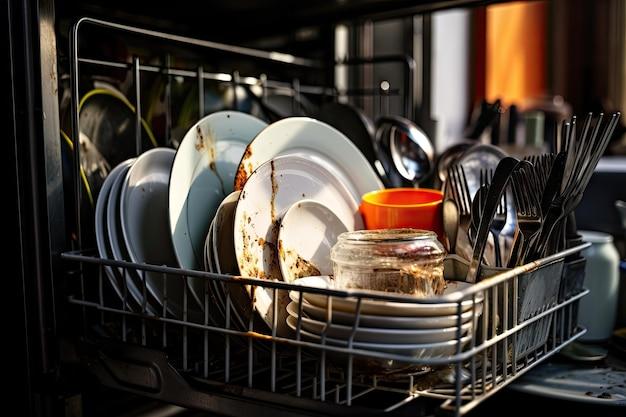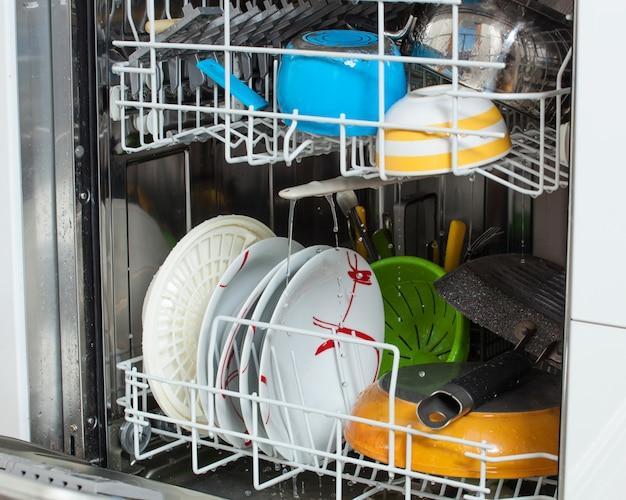Picture this: you’re hosting a dinner party, and after the meal, you’re left with a mountain of dirty dishes. As you sort through the mess, you come across a plastic container with a number 5 symbol on the bottom. You’re not quite sure if it’s safe to put in the dishwasher. Should you risk it or play it safe?
In this blog post, we will explore the common dilemma of whether you can safely put number 5 plastic in the dishwasher. We’ll also delve into related questions about the safety of plastic for food, the presence of BPA, and the effects of plastic leaching. So, let’s dive in and find out what’s the best way to deal with plastic number 5 when it comes to keeping our dishes clean!
Can You Put Number 5 Plastic In The Dishwasher
It’s Time to Set the Record Straight on Recycling
You’ve just had a delicious meal, and now it’s time to tackle the aftermath: the dreaded dirty dishes. As you stand there, staring at the pile of plates and utensils, a question pops into your mind – can you put number 5 plastic in the dishwasher? It’s a valid question, and one that deserves a definitive answer. So, grab your sponge and let’s dive into the world of plastic recycling!
The Mystery of Number 5 Plastic Unveiled
To understand if number 5 plastic, also known as Polypropylene (PP), can take the heat of the dishwasher, we need to uncover the secrets of this versatile material. Number 5 plastic can be found in a variety of products, such as yogurt containers, ketchup bottles, and even baby bottles. But does this mean they can handle the dishwasher’s relentless spray of water and scorching temperatures? Let’s find out!
A Splash of Science: The Dishwasher Dilemma
When it comes to putting number 5 plastic in the dishwasher, the answer is not a straightforward one. While some number 5 plastics are labeled as dishwasher-safe, others may not have the same tolerance for the hot water and rigorous cleaning cycles. So, how can you tell if your number 5 plastic is dishwasher-friendly?
Decoding the Dishwasher-Safe Symbols
Fear not, my cleanliness-seeking friend! The secret lies in deciphering the dishwasher-safe symbols stamped on the bottom of your plastic items. Look for a small plate or glass with water droplets cascading above or around it. This symbol is an indication that your number 5 plastic can withstand the dishwasher’s wrath without melting or warping.
Trust, but Verify: The Ultimate Test
If your number 5 plastic item lacks the clear dishwasher-safe symbol, it’s best to err on the side of caution. Just because it doesn’t have the symbol doesn’t mean it can’t handle the heat, but without confirmation, it’s a risky game to play. Your best bet is to consult the manufacturer’s guidelines or give it a good old-fashioned hand wash to be safe.
Plastic Poltergeist: Potential Pitfalls
Even if your number 5 plastic is labeled as dishwasher-safe, it’s important to note that repeated exposure to high temperatures can still cause gradual wear and tear. Over time, this can lead to cracks, weakening the integrity of the plastic. So, while it may survive a few rounds in the dishwasher, it’s best to rotate its cleaning method occasionally to extend its lifespan.
Quick Tips for Dishwasher Bliss
- Always check for the dishwasher-safe symbol on your number 5 plastic items before tossing them in.
- When in doubt, hand wash your plastic items to avoid any potential damage.
- Rotate between dishwasher and handwashing to prolong the life of your number 5 plastic.
- Consider switching to reusable and eco-friendly alternatives, such as glass or stainless steel, to minimize plastic waste.
Now that you’ve uncovered the truth behind number 5 plastic and its dishwasher compatibility, you can conquer your dirty dishes with confidence and wit! Just remember, when it comes to recycling and caring for the environment, a little knowledge, a splash of humor, and a sprinkle of common sense can go a long way. Happy (and sustainable) dishwashing, my friend!
FAQ: Can You Put Number 5 Plastic in the Dishwasher
In our quest to lead convenient, eco-friendly lives, we often face dilemmas when it comes to using plastic. One common question that pops up is whether or not it’s safe to put number 5 plastic in the dishwasher. In this FAQ-style guide, we’ll address your burning questions and clear up any confusion.
What is the safest plastic for food
When it comes to food safety, not all plastics are created equal. Number 5 plastic, also known as polypropylene (PP), is considered one of the safest options for food storage and packaging. It has a high melting point, making it resistant to heat and less likely to leach harmful chemicals into your food.
Is BPA-free plastic still bad for you
Not all plastics contain Bisphenol A (BPA), a chemical that has raised concerns about its potential health effects. BPA-free plastic, including number 5 plastic, offers a safer alternative. However, it’s essential to note that studies continue to explore the long-term effects of other chemicals present in plastic, so moderation is key.
Is plastic 5 safe for growing vegetables
While number 5 plastic is generally safe for food contact, it is not recommended for growing vegetables. Plastic containers, including number 5 plastic, may contain additives that can leach into the soil and potentially affect the quality of your produce. It’s best to opt for specifically designed gardening containers for growing veggies.
Does number 5 plastic leach
Number 5 plastic has a relatively low risk of leaching harmful chemicals into food or beverages. Its composition and stability contribute to its resistance to leaching. However, it’s always a good idea to avoid exposing plastics to excessive heat or harsh conditions to minimize any potential leaching risks.
How can you tell if plastic has BPA
Identifying BPA in plastic can be tricky. Some plastics are labeled as BPA-free, but that doesn’t guarantee they are free from other potentially harmful chemicals. To be certain, look for the recycling label on the plastic item. If it displays a “number 5,” you can enjoy peace of mind knowing it’s a safer choice.
Can number 6 plastic be recycled
Number 6 plastic, also known as polystyrene (PS), is not as widely accepted for recycling as number 1 or 2 plastics. However, some recycling facilities may accept it. To ensure proper recycling, check with your local recycling program or choose alternatives that are more easily recyclable.
Can you freeze number 5 plastic
Yes, you can freeze food in number 5 plastic containers. Number 5 plastic performs well in low temperatures and is less likely to crack or warp when exposed to freezing conditions. Just make sure to leave some room for expansion to avoid any unfortunate surprises in your freezer.
Is number 5 plastic BPA-free
Number 5 plastic, or PP, does not typically contain BPA. However, it’s essential to check the labeling to confirm that the specific product you’re using is BPA-free. By choosing number 5 plastic, you’re already opting for a safer alternative.
What can I do with number 5 plastic
Don’t throw away your number 5 plastic just yet! Many recycling programs accept number 5 plastic for recycling. Additionally, you can repurpose your containers for storage, organize small items, or even get creative with DIY crafts. Number 5 plastic’s durability makes it highly reusable, reducing waste and benefiting the environment.
What are the harmful effects of BPA
Bisphenol A (BPA) has been linked to various health concerns, including hormone disruption, reproductive issues, and potential effects on brain development. While the long-term effects are still being explored, opting for BPA-free alternatives like number 5 plastic helps mitigate potential risks.
Can you freeze meat in a plastic container
Number 5 plastic containers are generally safe for freezing meat. They are designed to withstand low temperatures and help protect your meat from freezer burn. However, it’s essential to use quality containers without any cracks or damage to prevent contamination.
Is number 5 plastic dishwasher safe
Yes, number 5 plastic is generally safe for the dishwasher. It can withstand the heat and water pressure typically found in dishwashers. However, always check the specific instructions on the plastic item or packaging to ensure it is dishwasher-safe.
Can I microwave number 5 plastic
Number 5 plastic, or PP, is microwave-safe in many cases. It can handle the heat without melting or releasing harmful chemicals. However, always refer to the packaging or product instructions to ensure it is labeled as microwave-safe before heating your food.
Is it safe to freeze in plastic containers
Freezing food in plastic containers is generally safe, especially when using containers specifically designed for freezing. Number 5 plastic containers are a reliable option for freezing, as they have good resistance to low temperatures. Just ensure the containers are in good condition to prevent any potential leakage.
How many times can you reuse plastic containers
The lifespan of plastic containers depends on their quality and intended use. Generally, it’s recommended to reuse plastic containers as long as they are free from cracks, warping, or significant wear and tear. With proper care and cleaning, you can reuse number 5 plastic containers many times, reducing waste in the process.
What plastic is safe to freeze
Number 5 plastic, polypropylene (PP), is considered one of the safest plastics for freezing. Its durability and resistance to low temperatures make it ideal for freezer storage. Look for containers labeled as “freezer-safe” or those specifically designed for freezing to ensure the best results.
How safe is number 5 plastic
Number 5 plastic is considered relatively safe for food and beverage use. Its stability, resistance to heat, and low risk of leaching contribute to its safety profile. However, it’s always a good idea to use it in moderation and avoid exposing it to excessive heat or harsh conditions whenever possible.
Is it safe to microwave in plastic
While certain plastics, like number 5 (PP), are generally safe for microwave use, it’s crucial to follow specific guidelines. Make sure the plastic is labeled as microwave-safe and avoid using plastic containers or wrap that is cracked, melted, or damaged. Always use microwavable glass or ceramic containers when in doubt.
Does Whole Foods recycle number 5 plastic
As of 2023, Whole Foods Market is committed to recycling number 5 plastics through its Gimme 5 program. This initiative encourages customers to drop off their clean number 5 plastic containers at participating Whole Foods locations for recycling. By supporting such programs, we can contribute to reducing plastic waste and promoting sustainability.
What plastic can I microwave
When it comes to microwave-safe plastics, look for containers labeled with the microwave-safe symbol or the number 5 (PP). These plastics can handle the heat without melting or releasing harmful chemicals. However, always exercise caution and follow specific instructions provided by the manufacturer to ensure safe microwave use.
Now that you’re armed with knowledge and answers to your burning questions, you can make informed decisions about using number 5 plastic in the dishwasher. Remember to prioritize safety, sustainability, and mindful plastic usage in your daily life. Happy dishwashing!

